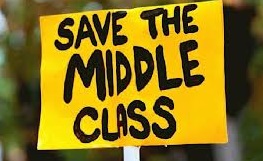Bye-Bye Miss American Pie -- The New Middle Class Malaise

Here is a headline that Washington and the Fed cannot “ease” away … America’s Middle Class is dying. In the past decade, middle class household income has been stagnant and the number of Americans living in poverty and on food stamps has risen dramatically. Among folks in the economic center, home ownership has plummeted and personal debt has risen. What’s worse, optimism is waning as the majority of the American middle class now believe that they could slip out of this iconic group into a lower, social class standing for the first time in their lives.
But what exactly is the American middle class? To politicians, it is something that everyone seems to want to “get into” and yet there is no clear criteria or precise benchmark for being included. Does it mean having a house, a car, a computer, and high speed Internet? Does it mean living in a certain zip code or having a certain amount of money in the bank? Does it mean owning a specific class of investments or having a lower debt-to-income ratio?
The reality is that the middle class is a notoriously blurred line between rich and poor, between tax shelters and supplementary benefits, between passive income and public assistance. It is the catch-all category between those that own luxury jets and those that are living pay-check to pay-check. Today almost 90% of us consider ourselves some variation of middle class whether lower, dead center, or upwards of the middle.
While US economic growth has improved since the 2008 recession, there has been no happy ending for those toiling at the center of America’s economic engine room. Corporations have enjoyed renewed profits while employees have been taking home dwindling pay checks. As a result, middle class spending has contracted. This comes as no surprise to those privy to the financial struggles of Sears, JC Penney, Loehmann’s, and Best Buy … the last vestiges of the working-class bargain store now on the verge of extinction.
So what went wrong with a recovery that left the heart of America behind? First of all, this is not your parents’ middle class. While Mom and Dad enjoyed an era of near full employment, unchecked suburban sprawl, balanced budgets, easy credit, and a veritable world of plenty … we are living in a very different time. In October of last year, our National Debt eclipsed the $17 trillion mark, making it higher than our total economic output. The US Labor Participation Rate is now at its lowest level since the Carter years, the US dollar has lost half of its purchasing power since the1980’s, and the recent US Housing Bubble wiped out half the net worth of America’s middle class. To add insult to injury, while overall US home ownership has plummeted, international interest in American real estate has surged particularly among buyers from China, the UK and the Persian Gulf.
The lesson here is vulnerability. The US middle class has learned that there is tremendous risk in holding a single-asset class as a nest egg, a retirement plan, and a measure of wealth. The only way to truly secure one’s socio-economic fate is to have multiple sources of income and a diversified investment strategy.
The media has recently been abuzz with word that Canada’s middle class has now surpassed America’s as the richest in the world. It’s interesting to note that Canada is currently in a housing bubble and if the Canadian middle class fails to diversify their asset classes as the US middle class failed to do … they too will lose their earning power, erode their personal wealth, and quickly shed their overriding sense of optimism.